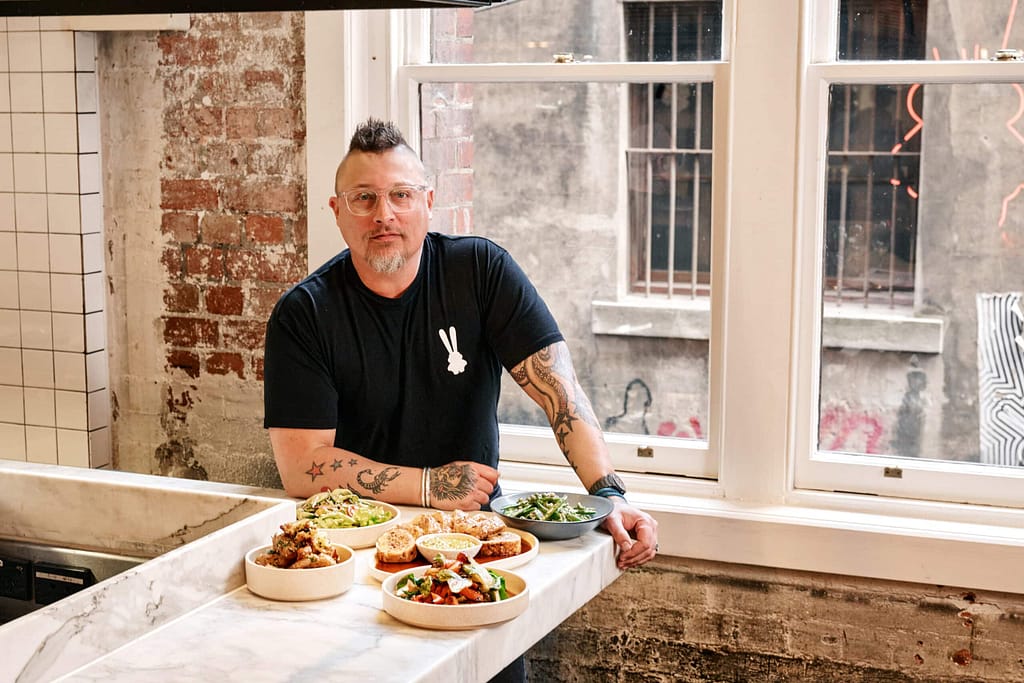[[{“value”:”
Chin Chin Executive Chef Benjamin Cooper on how coffee has influenced the way he questions and cooks with food, and the reason he’s a fussy espresso drinker.
Benjamin Cooper has an advantage over most fine- dining chefs when it comes to coffee knowledge. For five years he worked as Head Chef at Melbourne coffee institution St Ali, and the experience, he says, helped shape his appreciation for coffee, but also his approach to food.
“My work at St Ali just happened organically. My whole career has been like that. Life has put me wherever I’ve needed to be at the time. It was amazing. I embraced it, and had an incredible time creating some really cool coffee dinners,” Benjamin tells BeanScene.
“I was lucky that Sal [Salvatore Malatesta, St Ali Creative Director] had enough faith in me to let me do my thing. It was a chance to break the shackles and play freely with food. We drew inspiration from Middle Eastern, Mediterranean cuisines, European, Asian, South American. It was an exciting time.”
Benjamin loved jumping behind a La Marzocco coffee machine on the bar, and visiting the roastery where he would seek inspiration from the roasting process. “Coffee is a fascinating world, and I got to appease my curiosity in why and how a good coffee is made, from the rate of extraction and dosage, to even pressure on the tamp,” he says.
“I’d often stand by the coffee roaster, talk to the roaster, watch, and smell the drop of freshly roasted beans, and something would kick into gear. It allowed a dish to make its way into my head.”
Benjamin saw coffee not just as a beverage, but an ingredient for which he took inspiration in the way flavour notes could be extracted.
“From a chef’s perspective, roasting coffee and extraction of flavour is like playing with dried spices,” he says.
“I remember when we first started getting into really high quality pour overs and filter coffees [at St Ali], I’d taste strawberry and vegetal notes, and it was mind blowing. Coffee is a super complex world and I have the utmost respect for the industry.
“Any time you find anything that has unique flavour, properties and qualities, and you discover unique ways of extracting those innate qualities, it makes you openly question everything you’ve learned and the things you do, and question whether those methods of extraction can impact the way you do things.”
For Benjamin, filter coffee methods made him question the way he extracted flavour from lemongrass, fruits, and oils, the way he produced a certain soup, wet and soaked whole spices, and added flavour to dishes.
Benjamin grew up in the small town of Taree in New South Wales in the days when drip, percolated, and instant coffee were still dominant. Coffee was always in the family home, but Benjamin was forced to become a purist from the get-go due to his dairy allergy.
“I remember the first time I had a black coffee, and no sugar. I almost fell over backwards. ‘What is this stuff that all the adults keep raving about?’ This is disgraceful. ‘How could you ever drink this?’ But it stuck with me. I’ve never drunk anything else other than black coffee: espresso, long black, batch brew or pour over,” he says.
Benjamin is honest about this love for espresso, to the point he says he’s “very, very fussy”.
“It’s got to have beautiful crema, a beautiful viscous – viscosity verging on syrupy, good aroma, and hot enough that it needs to sit for about 30 seconds before I take my sip,” he says.
Benjamin has a Giotto Rocket machine at home, a Mini Mazzer grinder, three different pour overs, two Chemex, and an AeroPress. When he’s in Sydney visiting Chin Chin’s second venue in Surry Hills, he visits Paramount Coffee Project and Corduroy Café, which does “exceptional Vegemite toast” and “super tasty coffee”.
In Melbourne, Benjamin enjoys visiting Proud Mary, Onethirtytwo, and Bowery To Williamsburg – which make him a Red Eye: a filter coffee with an espresso shot added in.
“Sometimes you wake up and say, ‘I need caffeine’ to get your heart pumping. From a flavour perspective the Red Eye is actually quite enjoyable. You get the floral high end tea quality notes of filter, but you also get the punch and the depth of an espresso,” he says.
He credits Melbourne’s iconic coffee scene to its rich European history, acknowledging the Greeks and Italians who brought with them a love for espresso, and the Asian countries of Vietnam, China, and Japan for their filter methods.
“This influence, paired with the lack of fear that you tend to see in Australian hospitality, to push the boundaries and go in new directions, really spurred on the growth of coffee and the opportunity for coffee,” he says.
“You name it, you can find it in Melbourne from Vietnamese and Turkish coffee to old school Italian espresso as strong as they come, to super refined Japanese pour over. It’s all here. Eventually that brings out the best in everything. When a city can respect deeply, cool things happen.”
Benjamin says the country has been fortunate to have coffee roasters who pay attention and adapt to different roasting styles to meet different consumption and brewing trends.
“We’re incredibly lucky to have gone through the coffee wave where the passion for excellence was elevated beyond everything. Coffee, tea wine and beer are incredibly passion-based. It’s an artisan culture. When you get to speak and share time with anyone from those industries, it has a positive impact on yourself. It’s energising and inspiring,” he says.
“It’s also undoubtable, that the growth of respect for coffee farming has had impacts throughout other agricultural processes.”
Benjamin pursued his culinary talents in Sydney before travelling to London,but it is Melbourne where he has built his career, most notably working at the iconic Flinders Lane restaurant Chin Chin for the past 12 years.
“Chin Chin is an absolutely incredible restaurant, and I feel lucky to have been part of it. It came along at a point where it probably broke the mould for how restaurants operate and the way we do things, and Melbourne really embraced us, Sydney too,” Benjamin says.
“You’re lucky to be busy. You want to make sure your guests get the absolute best experience they can. Every day, the whole team comes to work to ensure that’s the case – to go to the ninth degree to make people’s days fun and wonderful.”
That level doesn’t go unnoticed, with guests invited to dine, drink, and indulge in kitchen and bar environment, surrounded by visual and sound stimulants, and an energetic vibe from morning to night.
“From the start, Chin Chin has been positioned as an experience and an escape from people’s day-to-day life. It’s about understanding the quality of all things combined that make a dining experience memorable,” Benjamin says.
“At its core, if you asked everyone in the hospitality industry, 99 per cent of people would say they got into the industry to make people happy. It’s as simple as that.”
To continue that connection, Chin Chin regularly hosts cooking classes in Melbourne and Sydney. It’s a concept that launched during COVID-19 and has become an incredible success since. Head Chef Benjamin conducts a demonstration before participants make three to five dishes, which they get to enjoy afterwards, followed by a Q&A session.
“It’s been a really fun extension of my career. It’s nice to share knowledge and stand in a room full of people and have them be interested and curious about what you have to teach them. It’s been one of the most exciting things I’ve been able to do, and it will only continue to grow,” he says.
On the professional side of the kitchen, Lucas Restaurants, which owns Chin Chin, also runs an apprenticeship program across its suite of venues, which Benjamin gets great enjoyment from.
“We really try and spend time with those young chefs, to nurture their growth and ensure they’re not jaded by what could be challenging industry,” he says.
“For me, more and more, the opportunities to work with the junior staff and to share the passion for the industry is so important, and to ensure it doesn’t disappear. Rightly or wrongly, people sometimes think this industry’s hard, and it is, but it’s also wonderful.
“I love the creative side of this industry. I love pushing the boundaries and being part of energetic growth that pushes you to deliver great things. Let’s keep doing what we’re doing.”
This article appears in the February 2024 edition of BeanScene. Subscribe HERE.
“}]]


